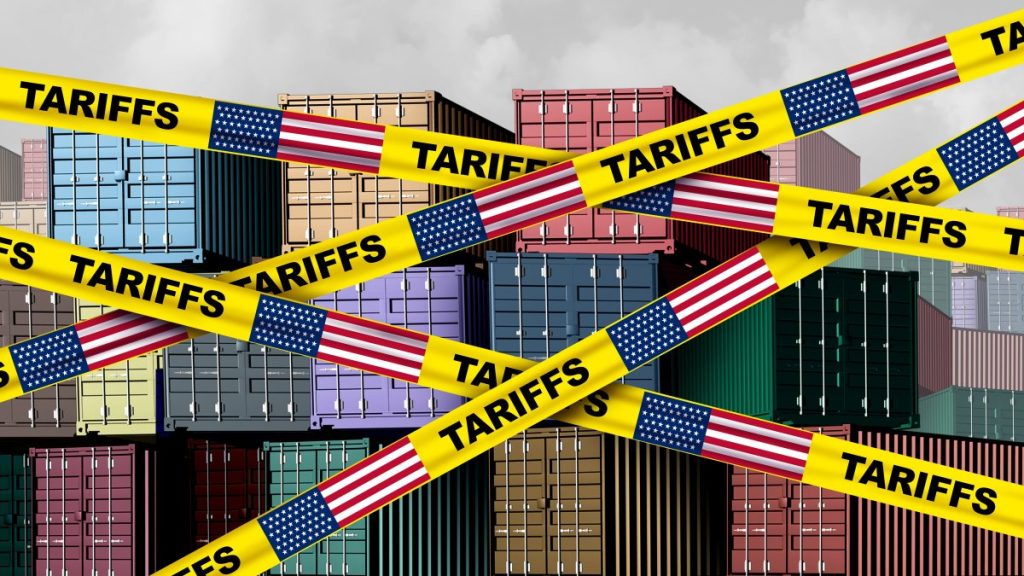Since Donald Trump retook the presidency in January 2025, his administration has reignited concerns about the future of the liberal world trade system – a framework the United States has shaped and sustained for eight decades. Trump’s tariff policies on a wide range of countries, including regional partners like Canada and Mexico, have sparked fears not only for the United States-Mexico-Canada Agreement’s (USMCA) free trade system but also for the broader global trade order, governed and adjudicated by the World Trade Organization (WTO). Are we on the brink of seeing this system collapse under the weight of escalating trade disputes?
3 scenarios of trade war
Three potential trajectories could unfold as Trump’s tariff policies take effect. The first is a descent into full-blown trade wars, reminiscent of the 1920s and 1930s. During that period, the U.S. Smoot-Hawley Tariff Act of 1930 triggered retaliatory tariffs worldwide, shrinking global trade by over 60% and deepening the Great Depression. Today, China, Mexico and Canada have already signaled their intent to retaliate against Trump’s proposed tariffs –China with threats to target U.S. agricultural exports, and Canada and Mexico eyeing countermeasures on energy and manufacturing goods. Such a tit-for-tat escalation could fracture global supply chains, raise production costs and drive up prices for consumers. The IMF has warned that a 10% global tariff increase could shrink world GDP by 1% within two years, a scenario no party, including the Trump administration, desires. Instead, Trump’s stated goal is to renegotiate trade deals to address the U.S.’ persistent trade deficit – $800 billion in 2023 alone – and the offshoring of labor-intensive industries.
The second possibility is that targeted countries concede to renegotiation, offering concessions to narrow the U.S. trade deficit. Historical precedent exists: Trump’s first term saw the USMCA replace the North American Free Trade Agreement (NAFTA) in 2020 after intense bargaining, with Mexico agreeing to stricter labor rules and Canada opening its dairy market. Yet, this outcome won’t come easily. Trade liberalization is a complex bargaining game, as evidenced by the stalled Doha Round of WTO talks, which began in 2001 and fizzled out by 2015 amid clashing interests. Countries like China, with its $300 billion trade surplus with the U.S. in 2023, or the EU, a key exporter of machinery and vehicles, will likely deploy counter-tariffs as leverage, prolonging negotiations and testing the resilience of global trade norms.
The third possibility is that Trump’s tariffs backfire, forcing the U.S. to retreat to existing regional and international agreements. This could happen in three ways. First, U.S. export sectors – think soybeans, which saw a 70% drop in sales to China during the 2018 trade war – could pressure the administration as retaliatory tariffs bite. Second, rising consumer prices (e.g., a projected 20% increase in electronics costs due to tariffs on Chinese goods, per the Consumer Technology Association) could erode public support, especially ahead of the 2026 midterms. Third, the WTO could rule against U.S. tariffs, as it did in 2022 when it found Trump-era steel tariffs violated trade rules. While Trump has criticized the WTO, outright defiance might alienate allies and destabilize markets further, nudging his administration back toward compliance.
Future of global trade
So, will the liberal world trade system collapse? No, not entirely. The first scenario, a collapse into 1930s-style trade wars, is unlikely. The memory of that era’s economic devastation remains a deterrent, and modern economies are too interconnected – global trade hit $28 trillion in 2022, per U.N. Trade and Development (UNCTAD) – to risk total breakdown. The second and third scenarios suggest the WTO will endure, albeit weakened. Countries facing U.S. tariffs are already pivoting: the European Union is deepening ties with Mercosur, and Asia’s RCEP, covering 30% of global GDP, gained traction in 2023. This shift toward regionalization is clear evidence of adaptation, not abandonment, of trade liberalization.
For Canada and Mexico, the stakes are higher. The U.S. absorbs 80% of Canada’s exports and 83% of Mexico’s, per 2024 World Bank data. Prolonged tariffs – say, Trump’s proposed 25% on their goods – could tip both into recession within a year, as the Peterson Institute estimates a 2% GDP drop for each. Yet, their reliance on the U.S. market limits their options. While they’ll seek new partners (Canada’s trade with the EU grew 10% annually since the Canada-European Union Comprehensive Economic and Trade Agreement’s (CETA) 2017 launch), resolving disputes with the U.S. will remain a priority. The U.S., too, would feel the pinch – higher input costs for autos and energy could add $50 billion annually to business expenses, per the U.S. Chamber of Commerce.
In sum, the WTO remains relevant and will likely stay so. Its principles of nondiscrimination and dispute resolution have lifted global welfare – world trade growth outpaced GDP growth by 1.5 times from 1995 to 2015, per WTO data – while offering a buffer against trade wars. Yet, liberal trade’s side effect, income redistribution, fuels today’s disputes: import-hit sectors shrink, export industries boom and the losers demand protection. The WTO won’t collapse, but its members are unlikely to pursue bold new liberalization soon. Instead, expect a turn toward regional deals and bilateral pacts – a fragmented but still functional trade system navigating Trump’s tariff storm.


